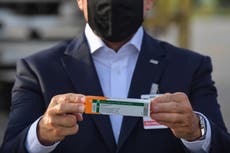Bolosonaro says Covid vaccine may turn people into crocodiles in bizarre rant
President also suggested women may grow beards as a result of jab
Brazilian president Jair Bolsonaro has again lashed out at coronavirus vaccines, saying that Pfizer’s shot could turn people into crocodiles, among other bizarre claims.
During the outlandish rant on Thursday, Mr Bolsonaro suggested that the vaccine could also lead to women growing facial hair and men speaking with effeminate voices.
"In the Pfizer contract, it's very clear: 'We're not responsible for any side effects.' If you turn into a crocodile, that's your problem,” Mr Bolsonaro said about the life-saving jab, according to Agence France-Presse.
He continued: "If you become superhuman, if a woman starts to grow a beard or if a man starts to speak with an effeminate voice, they [Pfizer] won't have anything to do with it.”
The UK became the first western country to authorise the Pfizer candidate earlier this month.
Clinical trials of the shot involving more than 43,500 volunteers, with more than 20,000 receiving the vaccine, showed the jab was 95 per cent effective in its protection against the novel coronavirus.
Mr Bolsonaro, who recovered from Covid-19 earlier this year, has insisted that he will not receive a vaccine on a number of occasions and has maintained that people should be permitted to refuse the shot.
"Some people say I’m giving a bad example. But to the imbeciles, to the idiots that say this, I tell them I've already caught the virus, I have the antibodies, so why get vaccinated?” he said on Thursday.
In November, the president expressed similar sentiment saying: "I tell you; I will not take [any vaccine]. It is my right and I am sure that Congress will not create difficulties for whoever doesn't want to take a vaccine.”
"If it is effective, lasting, reliable, whoever doesn't take it will be doing harm only to himself, and who takes the vaccine will not be infected. There's nothing to worry about.”
Some political commentators have suggested that the president’s averse attitude to the vaccine is political in nature.
João Doria, Mr Bolsonaro’s probable challenger for the next presidential election, is the biggest supporter of one vaccine candidate: CoronaVac.
On Thursday, the country’s supreme court ruled that all Brazilians are required to be vaccinated against Covid-19, but would not be taken by force to receive shots, Bloomberg reported.
Mr Bolsonaro has promised to make all Covid-19 shots approved by the health regulator available to the public, but has maintained that “nobody can force anybody to take the vaccine”.
Common side-effects of vaccines include pain, swelling, or redness at the injection site, mild fever, chills, fatigue, headache, and muscle and joint aches.
Only mild side-effects were reported during the Pfizer trials. As the jab began its rollout in Britain, there have been two reports of allergic reactions to the vaccine.
Vaccines can sometimes cause allergic reactions but they are usually rare and short-lived.
Brazil released a vaccination plan earlier this month that outlined the nation would initially provide only enough shots for about a quarter of the population. The plan also does not indicate a start date.
Infections of the novel coronavirus continue to rise in the country, which has amassed more than 70,500 confirmed cases and 186,000 deaths since the pandemic began, the second-highest number in the world.
Join our commenting forum
Join thought-provoking conversations, follow other Independent readers and see their replies
Comments





Bookmark popover
Removed from bookmarks